Movie Review – Impossible, The
This compelling true story is given much heft thanks to a terrific Naomi Watts, and a commendable Ewan McGregor, and a surprising turn from newcomer Tom Holland. While it does occasionally smack of Oscar-bait (the film was nominated for Best Picture for 2012) there’s an underlying truth here that cannot be ignored. Powerfully filmed, superbly acted by almost everyone, and delivering a catastrophic disaster that reaches the most human of levels, The Impossible is gripping, memorable cinema at its finest.
– Summary –
Director : JA Bayona
Year Of Release : 2012
Principal Cast : Naomi Watts, Ewan McGregor, Tom Holland, Samuel Joslin, Oaklee Pendergast, Marta Etura, Sonke Mohring, Geraldine Chaplin.
Approx Running Time : 113 Minutes
Synopsis: The story of one family’s desperate race for survival during the 2004 Boxing Day Tsunami in Indonesia.
What we think : This compelling true story is given much heft thanks to a terrific Naomi Watts, and a commendable Ewan McGregor, and a surprising turn from newcomer Tom Holland. While it does occasionally smack of Oscar-bait (the film was nominated for Best Picture for 2012) there’s an underlying truth here that cannot be ignored. Powerfully filmed, superbly acted by almost everyone, and delivering a catastrophic disaster that reaches the most human of levels, The Impossible is gripping, memorable cinema at its finest.
**********************
Ride the wave.
When news broke on Boxing Day 2004 that an earthquake had struck off the coast of Indonesia, I don’t think anyone expected the results to be quite so catastrophic. While the earthquake itself caused only minor damage at best, the resultant tsunami wreaked havoc and carnage across multiple continents, particularly Indonesia, Thailand, as well as the coast of India, Africa, and the Maldives, among others. Caught up in this horrific tragedy – the largest catastrophe of its kind since the early 1900’s – was the Belon family, with Maria and her husband Enrique, together with their three children, holidaying in Thailand before becoming separated by the thundering flood-waters and having to try and find each other again. The heart-wrenching nature of this story is such that it’s moving even without being a film; a film such as this was always going to happen, I guess, considering the stories of luck and survival to come out of any tragedy almost invariably find their way onto our screens, and for me it was only a matter of how trite and cliched it was going to be. The Impossible sets itself a mighty challenge: how to deliver the truly monstrous scope of the tragedy, while maintaining the human interest in a single family throughout. Does The Impossible deliver the…. ahem, impossible, or is the film simply all show and no go, a well produced yet emotionally empty attempt to dramatize an event so cataclysmic to so many it’s a failed mission?
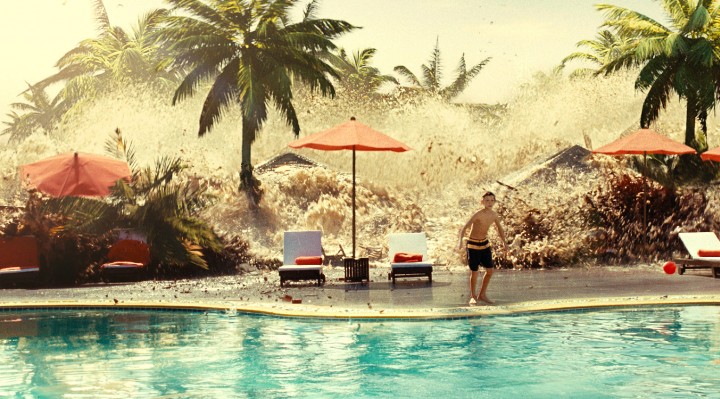
On holiday in Thailand, Maria Bennett (Naomi Watts) and her husband Henry (Ewan McGregor), together with their three children, Lucas (Tom Holland), Thomas (Samuel Joslin) and Simon (Oaklee Pendergast) are suddenly separated by the thundering tsunami caused by the Indian Ocean earthquake of 2004. As Maria and Lucas manage to make their way to a hospital, Lucas begins to search for other survivors, particularly his father and brothers, whom he assumed are now dead.
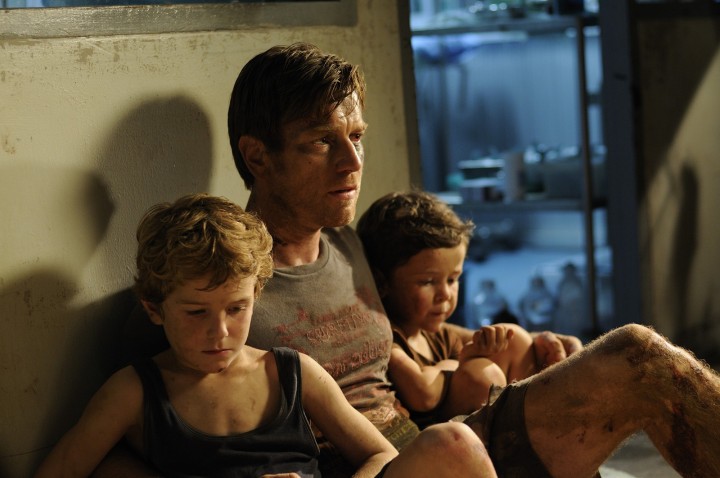
The Impossible is a simple survival story, told with contemplative, restrained style by director JA Bayona. It could be anyone, really, who must traverse the horrors of the events herein, and I guess that is possibly why the nationality of the central family has been changed from the Belon’s Spanish heritage, to a more Anglicized version with Naomi Watts and Ewan McGregor. It makes little difference, in my opinion, but if you’re disappointed the story isn’t truly truthful in this regard, you’re really just nitpicking. The film’s groundswell of emotion is hampered by a feeling of awards season bating (Naomi Watts has top billing, but I think is outperformed by both McGregor and newbie Tom Holland) and a kinda-sorta obviousness about the entire thing, but it’s given a fair heft by Bayona’s refusal to sensationalize the events of that day. As such, I’m inclined to say I think this is a worthy Oscar contender (it didn’t win Best Picture, but was at least nominated) and a film that captures the terror, horror and utter confusion of one of the most tragic days of the new millennium.
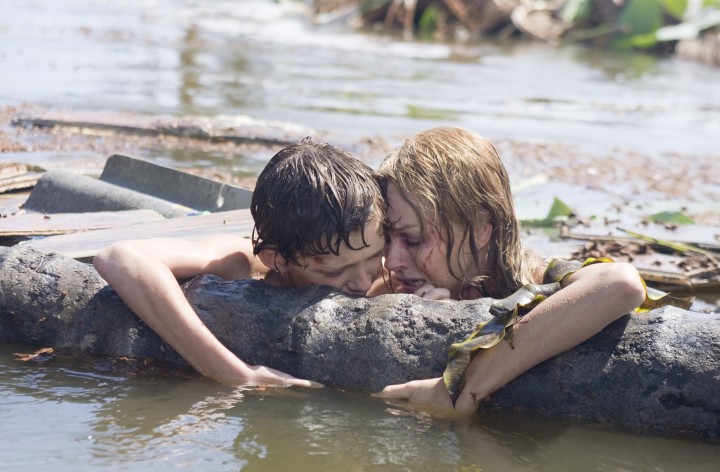
Naomi Watts and Ewan McGregor are wonderfully restrained, delivering nuanced and delicate performances that straddle the extremes of human emotion within the circumstances. Watts is terrific, make no mistake, but by the time both her and Tom Holland, as Lucas, find their way to a Thai hospital, she’s reduced to lying on a gurney looking sickly bad, comforted by her son and eventually dropping out of the film for a while. Tom Holland, as Lucas, is also terrific, albeit a little wooden in moments where the drama overreaches his ability. That’s not his fault – he’s a competent child actor, if missing a vitality some have over him – and these moments become less as the film goes on, leaving me with an impression of his remarkable ability to convey childlike terror and situational-inspired maturity. To be honest, I think Holland actually outshines Watts at the end of the day, even though Watts herself is no slouch here. Ewan McGregor’s portrayal of Henry Bennett is typical of the man’s range – personifying strength and resilience against the worst possible odds, and allowing emotional outbursts when the situation demands. McGregor shoulders the latter half of the film, when the narrative shifts from the Watts/Holland venture, and he, along with the two kids playing the younger Bennett siblings, deliver solid, heartbreaking performances.
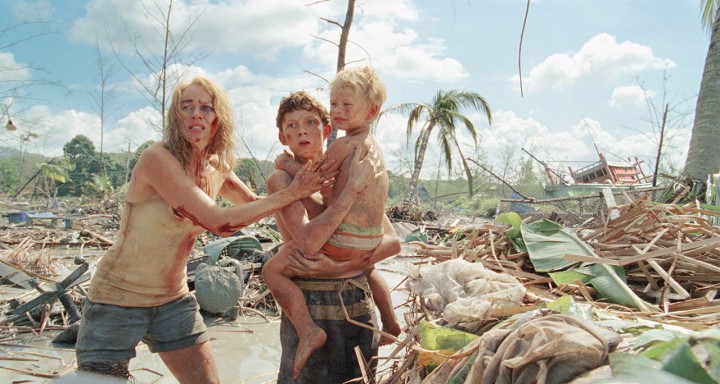
JA Bayona’s ability to dwell on the human toll of this disaster is compelling. From the initial roar and explosive destruction of the wave, to the swirling, torrent of water flooding into the landscape, to the confusion and chaos of the overrun hospitals and the Thai response to the catastrophe, Bayona keeps his focus purely on the humanity, instead of the disaster-porn he might otherwise have allowed. Sure, there’s destruction, but it happens around the human characters, and we’re almost given a first-person viewpoint throughout. This ensures that we never become swept up in the event itself, rather we remain rooted firmly in the fate of the human characters. It’s a well written script, although it does swerve to melodrama late in the film; and the old frustrating cliche, where characters miss each other by mere moments when they’re looking the other way, made me growl with annoyance throughout, but I consider this a positive reaction to a film designed to make me want these people to find each other again.
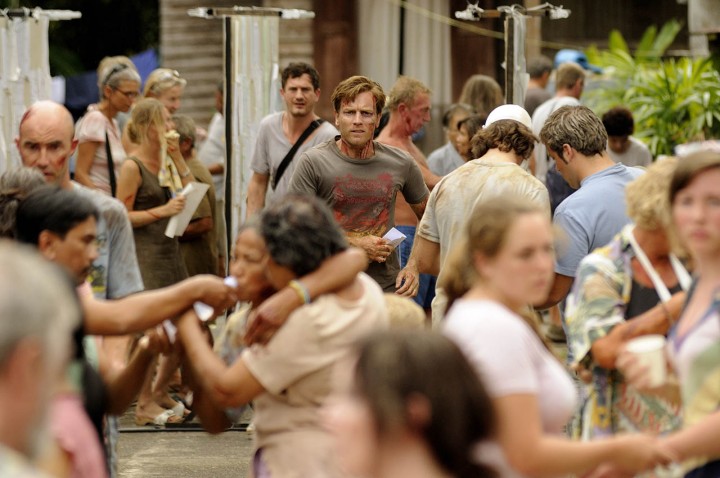
The mere fact that this entire family survived the initial tsunami deluge is a miracle in and of itself. The flotsam and jetsam of death beneath the water’s surface is accurately conveyed through a major injury to Watts’ Maria, and the production design of the ruined landscape and infrastructure is superb (and frightening). The outcome of the movie (unless you know the story) is riveting as it builds, although the ending is somewhat saccharine and “Hollywood”, lacking the resounding potency the opening 90 minutes exemplified. With a solid cast delivering wonderful performances, equally solid direction from JA Bayona, and a true-story of harrowing proportions to retell, The Impossible is gut-churning, soul-destroying cinema at its highest caliber.


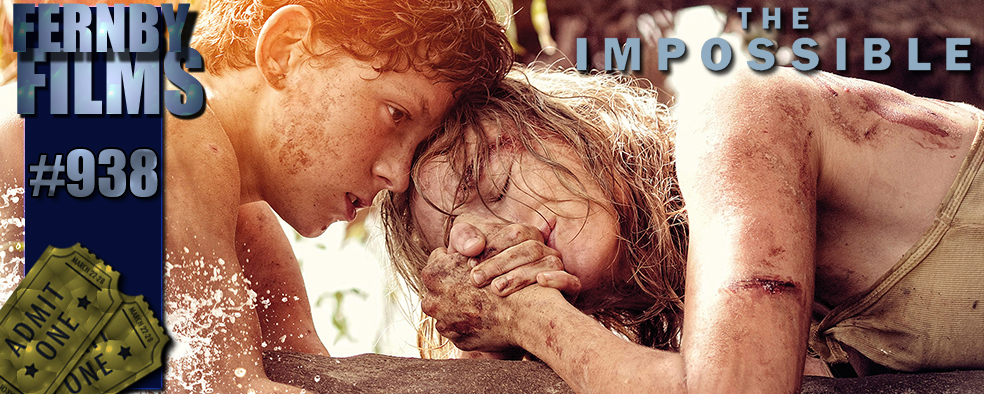







 Guest Spotlight Movie Review: The Impossible @ Cinematic Delights
Guest Spotlight Movie Review: The Impossible @ Cinematic Delights